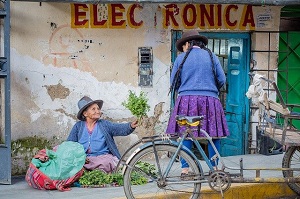One-off government cash handout not enough to help poor families
14 October 2021

Government intervention in Peru didn’t make difference for families unable to afford food during Covid-19 lockdowns
Sorting long-term financial inequality critical factor for improved food security
Some of the worst hit families experiencing food insecurity during the Covid-19 pandemic found that Government financial intervention didn’t effectively address the issue, new research has found.
The study looked at food insecurity among young families in Peru, where the global pandemic caused by Covid-19 has resulted in one of the worst economic shocks seen around the world. An international team of academics looked at food insecurity following the first nine months of the pandemic, and which factors influenced families’ ability to afford food.
The paper, published in Nutrients found that prior financial circumstances had the biggest bearing on food insecurity. Although the Peruvian government provided financial support to families through Bonos financial payments, those that received the support did not experience any improvement in food security than other families in a similar situation who didn’t get a payment.
The Bonos payments were issued in tranches during the national lockdown in Peru between March and July in 2020 and targeted 7 in 10 Peruvian households. The intervention was a single payment of PEN 760 per household, which is equivalent to 82% of the monthly minimum wage.
Professor Vimal Karani, Professor of Nutrigenetics and Nutrigenomics at the University of Reading, and lead author of the paper said:
“Our findings suggest that the short-term interventions of the Peruvian government and others around the world to help support families affected by the economic shock of Covid-19 were not effective.
“While the Bonos payments are recognised as one of the best tools at their disposal, our findings suggest that Peruvian families continued to be concerned about how they were going to put food on the table, resorting to missing meals or deliberately eating less nutritious food to make ends meet.
“It shows how significantly poverty and food security are linked, and how governments around the world need to take fundamental action to address poverty to avoid the long-term health and societal impacts of food insecurity.”
The study is the first of its kind to look at the relationship between economic conditions and food security in low- and middle-income countries over a long period. The longitudinal study draws on data first collected in 2002 and has tracked economic conditions including from birth. The research team hope that the study will be a model for other studies into the relationships between food, food security and poverty.
Professor Karani said:
“By continuing to track the same individuals over such a long time, we hope to be able to better understand some of the influences on non-communicable diseases and their relationship with food and poverty.
“Covid-19 has had such a huge effect on the world, and while our study was not initially designed to look at how the impact of a global pandemic would affect long-term health, such data will be incredibly important to ensure that we understand the true cost to our health.”
The findings are part of the SONGS project, which has received £908,837.58 from the Medical Research Council (MRC) and CONCYTEC- FONDECYT . The other institutions that will participate in this study are the Group for the Analysis of Development (Lima, Peru), University of Oxford (UK), the Nutrition Research Institute - Instituto de Investigacion de Investigacion Nutricional (Lima, Peru) and Pedro Ruiz Gallo National University (Trujillo, Peru).
Find out more about the SONGS project.
Full citation: Curi-Quinto, K.; Sánchez, A.; Lago-Berrocal, N.; Penny, M.E.; Murray, C.; Nunes, R.; Favara, M.; Wijeyesekera, A.; Lovegrove, J.; Soto-Cáceres, V.; Vimaleswaran, K.S. Role of Government Financial Support and Vulnerability Characteristics Associated with Food Insecurity during the COVID-19 Pandemic among Young Peruvians. Nutrients 2021, 13, 3546. https://doi.org/10.3390/nu13103546

